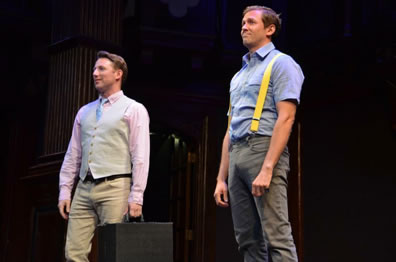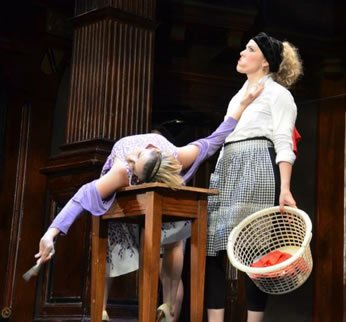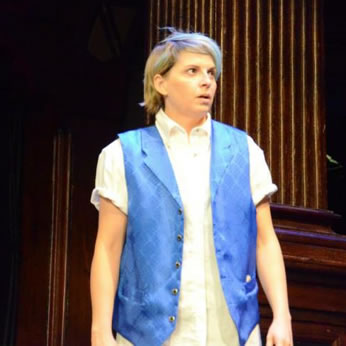The Two Gentlemen of Verona
One-Night-Only Is One for the Ages
Taffety Punk Theatre Company's Bootleg Shakespeare, Folger Theatre, Washington, D.C.
Monday, August 3, 2015, G–14&16 (right stalls)
Directed by Marcus Kyd

Valentine (Dan Crane, left) and Proteus (Shawn Fagan) part ways at the beginning of William Shakespeare's The Two Gentlemen of Verona, rehearsed in one day and played for one night only at the Folger Theatre by Taffety Punk as its annual Bootleg Shakespeare production. Photo by Emily Marquet, Taffety Punk.
With its annual Bootleg Shakespeare production, Taffety Punk Theatre Company pulls off a miracle.
That miracle is not necessarily how 22 actors could gather for the first time at 10 a.m. (some meeting each other for the first time) and at 8 p.m. present a fully formed production of William Shakespeare's The Two Gentlemen of Verona to a capacity audience at the Folger Theatre. I've seen this company do it before, (this is the ninth annual Bootleg Shakespeare production, which has become one of the most anticipated events on the Washington, D.C., theater calendar), so I don't consider that miraculous. Amazing, yes, because even with a handful of "line" calls, this staging plays as if a closely knit ensemble is performing a thoroughly visualized work deep into its run. The cast members are supposed to arrive for their first—and last—rehearsal off-book; however, so richly rendered are their performances that they also must have come in with a complete grasp of their characters. Achieving the perfect timing and tight blocking we see must be a combination of trust among the actors and in their director.
Because I can't adequately report on how all that is accomplished—they won't let me attend the rehearsal (I've asked)—I will focus this review on the real miracle: how this Bootleg Shakespeare production reveals The Two Gentlemen of Verona to be a great play. Director Marcus Kyd and his one-day company turn what I previously considered Shakespeare's single out-and-out failure into a Top Ten work in the canon (don't ask for the math: recent productions I've seen of Timon of Athens, Cymbeline, Pericles, and The Two Noble Kinsmen have expanded my Shakespeare Top Ten ranking 50 percent). What always seemed to me the play's plodding plot moves along smoothly, its pedantic comedy comes off as sharp wit, its obscure jokes are freshly funny, and its unevenly drawn characters become fully-fleshed personalities. As for that nonsense of an ending, it makes perfect sense in the performances of this all-star cast and Kyd's clear, unwavering vision.
The production's success starts with the modern dress. This is the fourth modern-dress production of Two Gents I recall seeing, and, ironically, the play works better because of it. We see the characters as us—or, maybe, not us but as our friends—or, maybe not our friends but as those acquaintances who irritate us.
Scott Hammar is credited for "costumes," but it looks as if most of the actors are wearing clothes from their own closets—except maybe Ashley Strand as Thurio. Goodness, I hope that's not his personal wardrobe, the wild-and-crazy look of an Italian playboy a decade or two behind current trends. Leading into Act III, Scene 1 (in which Proteus launches his plot to betray Valentine and court Sylvia for himself by tattling on their elopement plans to the Duke), Strand, a stand-up comedian touring one-man shows around the country, gets five or more minutes of stage time to himself as Thurio makes elaborate preparations to sunbathe. He disrobes to reveal his way-too-small Speedos and uses a rolled-up knee-length athletic sock as an enhancer. He sets up his lounger, sprays himself with tanning lotion (including the sock inside the Speedo), and is barely settled before the Duke and Proteus come on stage with the Duke ordering Thurio to "give us leave, I pray, awhile: We have some secrets to confer about." Shakespeare's stage direction for "Exit Thurio" becomes another several minutes of Strand as a sulking Thurio clumsily gathering up his lounger and gear—courageously embarrassing, considering what he's wearing—and plodding offstage.
This episode exemplifies what works so well in this production. The physical humor is obvious as is how well Strand captures the character of the silly rival suitor who is Thurio. But Kyd not only stays true to the text but uses Shakespeare's oddly constructed scene-opening line (Proteus and the Duke could have come on alone with no need to summarily dismiss a third actor entering with them) to allow a talented comedian to strut his stuff—or, at least, strut his rolled up sock.
Also in the text-centric vein, what might be the most archaic character in the play, Julia, becomes a revelation in Kimberly Gilbert's portrayal of her as an art nerd drama queen. This is no young woman in the first throes of first love, and no innocent victim not only witnessing but facilitating Proteus's betrayal of her. This Julia can out-irony Juno. Wearing an unfashionably frumpy dress, Gilbert's Julia seems socially clueless in her opening scene with her maid, Ursula (Paulina Guerrero), and the whole letter-dropping shtick becomes hilarious as Julia can't even hope to keep pace with Ursula's wiles and wit. She and Proteus (Shawn Fagan) are in love with the idea of being in love. Disguised as the boy—such a disguise, wearing a fashionable satin blue vest over button-down white shirt and with blue-tinted short hair, that not only Proteus but the audience could easily be fooled—Gilbert's Julia just barely tamps down her anger at Proteus. Her big reveal in the play's troublesome end becomes a piece of wonderful comedy as she yanks off her shirt on the line "And Julia herself has brought it hither" and Proteus can only gape at a bra he has never yet been allowed to see, probably on any woman.
About that troublesome ending—in which Proteus tries to rape Sylvia (Tonya Beckman) before Valentine (Dan Crane) intervenes and then, upon Proteus crying mercy, Valentine offers "All that was mine in Sylvia I give thee"—it ripples by here as perfectly genial comedy. Four elements make it so:
- Fagan portrays an incredibly charming Proteus from beginning to end. He not only charms the geeky Julia and the cheeky Ursula, as well as the Duke and Thurio (as much as such a man can be charmed), he also charms the audience. When he begins his soliloquy, he elicits vocal "ooohs" from an audience hoping he really doesn't intend to go down the path of betraying both his best friend and girlfriend, but Fagan reveals true psychological "Jessie's Girl" anguish in the soliloquy. It's a supremely deft performance. In the climactic final scene, even as he talks of raping Sylvia, Fagan infuses the lines with heartache, a guy in such a crush that he still thinks he's being romantic. That is not meant to sound forgiving, and Fagan is not playing the moment lightly (though Beckman generates laughs with Sylvia's sharp retorts), but he nevertheless shows us a confused and totally self-deluded young man (we should note here that the only person not charmed by Proteus is Beckman's Sylvia: her courtesy upon their first meeting in Milan is part of her flirting with Valentine).
- Crane's Valentine is not the brightest bulb in Milan, and he plays his pretty-house-nobody-home naïveté to great comic effect in every one of his scenes. In the opening act in which he jostles with best friend Proteus before they part ways, Crane's Valentine, who apparently has read a book or two and surfed some websites, too, can't match the passion-fueled intelligence of Fagan's Proteus. Beckman's Sylvia loses patience with Valentine when he doesn't see through her trick of having him write a letter to her chosen lover (himself), and Valentine remains helplessly clueless as Speed (Esther Williamson) tries to explain the practical joke to him. He strolls blithely into the Duke's trap, and he's obviously bluffing in his bluster with the outlaws (turns out they're dumber than he). Crane finally gives Valentine some nobility when he comes to Sylvia's aid against Proteus's attack, but he immediately goes into "well, that's cool" mode when Proteus repents. By this point, you can't take anything this Valentine says too seriously.
- And Beckman's Sylvia gets that. Though everybody in this cast is supremely funny, Beckman ultimately most informs the play's comic tone. In almost every play I've seen her in, Beckman gives insightful readings to Shakespeare's verse, staying true to its metrical foundation yet lacing the lines with 21st century naturalism, in this instance giving Sylvia a post-Bachelorette woman's attitude: it's purely Shakespearean and totally millennial. Her Sylvia can be sweet, biting, flirty, exasperated, silly, and noble on the turn of a line, and with this skill she stage-manages the men courting her, including Proteus, though she shows him unwavering disdain. However, it's not just what Beckman does with her lines but what she brings to other characters' lines in her expressive reactions. Thus does Beckman neutralize Valentine's apparent giving her away, looking askance at Crane as he speaks the line, then giving a "well, that's so Valentine" shrug and smiling at how he can be so naively sweet. Moments later, when Proteus says, "What is it in Sylvia's face but I may spy more fresh in Julia's, with a constant eye?" Beckman's Sylvia initially takes it as an insult, and her expression seems to say "what the...." But then she remembers that this is that jerk Proteus, and he is talking about that cute nerd Julia, and Beckman's expression turns to condescending contentment. One the many enigmatic elements of Two Gents is how Sylvia says nary a word from the time Valentine accosts Proteus in this final scene to the play's end; and yet Beckman earns one of the evening's biggest laughs at this moment with her silent line readings.
- Gilbert's Julia, however, gives a brazen line reading with perfect timing. Immedately upon Valentine seemingly offering Sylvia up to Proteus, Gilbert issues Julia's "O, me unhappy!" in the tone of an incredulous "O, my GOD!" and the clear meaning of "are you friggin' serious?" She doesn't faint so much as "swoon" with cynical rage.
This production has many such precious moments, whether generated by Shakespeare's script or Kyd abetting what's there in the text. As Julia discusses with Ursula the proposition of disguising as a boy to chase after Proteus, Ursula in black leggings, white shirt, checkered apron, and her hair done up in a black scarf, is folding laundry: a Folger t-shirt, a Shakespeare Theatre Company t-shirt, and a Taffety Punk t-shirt, acknowledging the city's three leading Shakespeare companies and generating titters among the with-it audience. However, Christopher Marino's Duke, carrying a yoga mat, wears a Motörhead t-shirt, showing him to be a New Age head banger. Antonio, Proteus's father, in this production becomes Antonia, Protius's mother played by Sheila Hennessey in designer blue jeans and sport jacket, and Pantino (Joe Brack) has the hots for her; he is more than eager to get her son off to join Valentine in Milan to get Protius's mom to himself.


Top, Julia (Kimberly Gilbert) regales Ursula (Paulina Guerrero) with her flights of fantasy and fancy for flight in Taffety Punk's Bootleg Shakespeare production of The Two Gentlemen of Verona at the Folger Theatre. Bottom, Julia disguised as a boy. Photos by Emily Marquet, Taffety Punk.
In the scene in which Valentine and Thurio engage in a witty trash-talking competition for Sylvia, what she calls "a fine volley of words," the three are playing badminton—yuck, yuck. (However, though they volley words with great skill, they are lousy at volleying the shuttlecock at the same time.) We are introduced to Milan with disco line dancing by the whole cast, and Thurio's "Who Is Sylvia" has been turned into a rap accompanied by a troupe of break dancers as the just-awakened Sylvia appears on the balcony wearing a robe and her eye shades shoved up onto her forehead bearing an expression of sleepy annoyance. Sir Eglamoure (James Flanagan) is into taking selfies with his smartphone (and lets the audience get into one, too), and Julia carries her excessively taped letter from Proteus that she had torn to shreds in the first act. When Sylvia gives her portrait to the disguised Julia that she promised to Proteus, Gilbert holds it up so that we can see the photo of a rabid-looking Beckman with "Leave me alone!" scrawled across it.
With so much comedy accomplished through the playing of the plot itself, who needs comical interludes delivered by a pair of clowns, right? Some see Lance and his dog Crab as the only redeeming quality of The Two Gentlemen of Verona, and though this production needs no redeeming, Daniel Flint carries on the 425-year tradition of delivering an endearingly humorous Lance. Wearing plaid jacket and vest, striped tie, checkered pants, and a crush pork pie hat (each piece of clothing a different color) and pulling a plush-toy pinscher on wheels to represent Crab, Flint uses the audience for props in his tale of parting from his family, and clearly illustrates how Crab created the odor in the banquet hall.
Meanwhile, among the most singularly brilliant performances from this cast of accomplished Shakespearean actors is that of Esther Williamson as Speed. Rather than playing Valentine's servant as a joking jester or a winking wit, Williamson delivers all of Speed's jokes as cynical observations, regarding everybody around her as fools to be tolerated. Her "whatever" expressions and "who'd-a-thunk" posture give Speed crackling relevance, and even when Williamson stumbles over a line, she applies the Speed treatment in self-deprecation. Williamson plays Speed as a woman, but thankfully Kyd and Williamson refrain from giving Speed romantic inclinations toward her master or fellow servant, as I've seen in other altered-gender casting. In fact, after she urges her master to become captain of the Outlaws, Williamson's Speed becomes one of the most enthusiastic of the bandits, shedding her cynical nature in the throes of robbing people of more than their pride.
Williamson's interactions with Proteus, Valentine, and Lance are so impeccably timed (the key to great comedy), and the chemistry of the rest of the company so solid—including among those actors who are not members of Taffety Punk—that this witness of more than 600 stage productions can't help questioning the credibility of the claim that this cast only got together for the first time that morning. Then again, they turn The Two Gentlemen of Verona into a truly great play, so anything is possible. Given that it plays as if it already had been running for a hundred nights, it's too bad this production didn't get that many performances so that more than a one-night-only audience could have seen this masterwork.
Eric Minton
August 29, 2015
Comment: e-mail editorial@shakespeareances.com.
Start a discussion in the Bardroom



 Find additional Shakespeareances
Find additional Shakespeareances